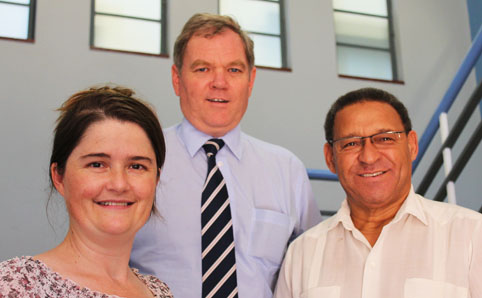Latest News Archive
Please select Category, Year, and then Month to display items
11 September 2024
|
Story Anthony Mthembu
|
Photo Anthony Mthembu and Chelsea Carolus
 From the left: Geraldine Lengau, Senior Officer in the Unit for Institutional Change at the UFS; and Oratile Reina, West College Prime.
From the left: Geraldine Lengau, Senior Officer in the Unit for Institutional Change at the UFS; and Oratile Reina, West College Prime.
As part of the initiatives lined up for College Week, the student leaders of West College at the University of the Free State (UFS) hosted a dialogue that primarily focused on discussing social justice as a value of Vision 130. The dialogue was held at Outeniqua Residence on 3 September 2024 and was well attended by students within West College.
According to Oratile Reina, West College Prime, “the motivation for the dialogue was to prepare newly elected leaders and our college community to align their efforts with Vision 130 – a vision that aims to create a more inclusive, equitable, and socially just environment on campus”. As such, she highlights that the dialogue was an opportunity for leaders to discuss practical strategies for implementing these values in their respective spaces, and to encourage those in West College to become better citizens inside and outside the university.
A conversation on social justice
The dialogue was facilitated by Geraldine Lengau, Senior Officer in the Unit for Institutional Change and Social Justice at the UFS. Lengau touched on several aspects pertaining to the topic of discussion. Firstly, she allowed the audience to give their definition of social justice, especially as students within the institution. In addition, she went on to talk to the audience about sexual assault in the context of social justice. In this instance, Lengau gauged whether the students knew which processes to follow in the event of a sexual assault incident, and whether they were acquainted with the UFS Sexual Harassment, Sexual Misconduct, and Sexual Violence Policy. Furthermore, the audience was given the opportunity to outline what social justice looks like to them in the spaces they occupy, including in their respective faculties, the sports they play, and the leadership structures they form part of. “I was encouraged to see that students take their right to a socially just university in very high regard, and that they were willing to break it down from what Vision 130 proposes, in order to align it with their common understanding,” said Lengau.
As the dialogue concluded, the audience signed a pledge committing to uphold the values of Vision 130. According to Reina, “The pledge represents a promise to take concrete steps towards fostering an inclusive and equitable campus culture. By signing the pledge, the leaders are not only agreeing to embody these principles in their leadership roles but are also holding themselves accountable to their peers and the broader university community.”
Do universities need theology faculties?
2012-03-27
 |
|
From left to right: Ms Anlené Taljaard, Department of Systematic Theology, Prof. Francois Tolmie, Dean: Faculty of Theology and Prof. Alan Boesak of the International Institute for Studies in Race, Reconciliation and Social Justice. All three are from the UFS.
Photo: Leonie Bolleurs
27 March 2012
|
Challenges facing training in theology in South Africa was the focus of a public lecture by Prof. Alan Boesak of the International Institute for Studies in Race, Reconciliation and Social Justice at the university. Prof. Boesak is one in a series of speakers who were invited by the university’s Faculty of Theology to discuss the broader theme of the transformation of knowledge. The presence of a faculty of theology at a public university has been a point of discussion in many circles.
“Our country needs an RDP of the soul and who better than the theology faculties to make a contribution in this regard?” asked Prof. Boesak.
“An important challenge for a faculty of theology lies in the content that theology students learn. Does the content reflect the context of South Africa today? Theology students must be prepared to make a positive, meaningful contribution in their congregations and communities within the realities of South Africa,” Prof. Boesak said.
Prof. Boesak’s lecture was attended by not only lecturers and students in theology, but also staff members from several other departments on the university’s Bloemfontein Campus.
Several national and international speakers will present guest lectures during the year in order to sketch a more complete picture of the “transformation of knowledge”.